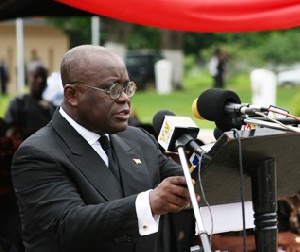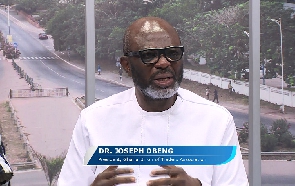- Home - News
- TWI News | TV
- Polls
- Year In Review
- News Archive
- Crime & Punishment
- Politics
- Regional
- Editorial
- Health
- Ghanaians Abroad
- Tabloid
- Africa
- Religion
- Election 2020
- Coronavirus
- News Videos | TV
- Photo Archives
- News Headlines
- Press Release
General News of Monday, 3 March 2008
Source: Statesman
Vote NPP for more affordable houses
"I look forward to a Ghana with planned neighbourhoods rather than unregulated and chaotic neighbourhoods. If a free society cannot provide decent accommodation for the many who are poor, it cannot prevent the spreading of container accommodation in the neighbourhoods of the few who are rich,” the Presidential Candidate of the New Patriotic Party, Nana Addo Dankwa Akufo-Addo stated this in a presentation to the Ghana Real Estate Developers Association, here in Accra last Friday.
He spoke against the decades-long phenomenon of out-of-control urbanization, which he said “cannot and should not be allowed to continue. It only results in poverty, unemployment, criminal activity, homelessness and a sanitation crisis which the Zoomlions of today are striving to tackle.”
He stressed, “But, we cannot merely roar the growing urbanization nightmare away. In order to tackle our housing shortage, we must prioritize the revival and improvement of urban and rural Ghana .”
His answer is to take urbanization to the rural areas: “We cannot responsibly deal with the rural-urban migration unless we devise and implement development programmes that bring urbanization to rural Ghana . Thus, rather than allowing the dire socio-economic circumstances to force rural dwellers to move into our city slums, we should take urbanization to them.”
Nana Akufo-Addo told the gathering of his party's “superior” philosophy in creating a decent environment for the masses, who can expect more and more affordable homes under an NPP government.
“We of the New Patriotic Party believe that what defines a civil society is the number of citizens given a stake in the country's prosperity. This is why one of the mantras of the New Patriotic Party is to enable a property-owning democracy in Ghana ,” Nana Akufo-Addo said.
However, he admitted that for many families their dream is simply to have a decent, affordable home to rent in a safe environment. This can be best done if government in partnership with estate developers, make the business of developing affordable homes on a massive scale a lucrative one, with the necessary investment and incentives.
The Presidential Candidate, who was instrumental as Foreign Minister in procuring lucrative estate development contracts in Angola for some members of GREDA, described the housing deficit, estimated to be between 500,000and 950,000 units, as unacceptable.
The president of GREDA, Alexander Tweneboah was happy with the meeting, which took place at La Palm Royal Hotel, Accra , describing it as the first of its kind in the history of the association.
He affirmed the readiness of his members to coordinate with Nana Akufo Addo’s government to address the numerous problems in the housing industry.
"Housing development should not be left to government alone but a partnership between the private and the public sectors and we will always be available to assist your government to make the necessary inputs in the housing sector.
"GREDA and Nana share a common passion and that is we believe in Ghana , that’s why we have come together to create jobs for Ghanaians and continue to contribute to the development of our great nation. We believe you can lead our nation into prosperity and we are sure to be safe under your government", he stated.
The NPP Presidential Candidate defended the party’s mantra of creating a property-owning democracy. "World history, most notably our own in 51-year-old Ghana , is brimming with examples of socialist states where only a tiny group of elites control the economy, while deceiving the majority with the empty shells of public ownership.
We can all attest to the ultimate deception of those who came into the office preaching left, yet when they finished claiming for themselves everything that was right, there was hardly anything left for the rest of us!" his statement read.
But, he conceded to the challenges working against the realisation of mass property ownership in Ghana . The country’s urban population explosion "presents enormous challenges, straining urban infrastructure, increasing waste, traffic, and homelessness at the major cities and causing brain drain in the migrating areas," Nana Akufo-Addo’s statement read.
"We can only democratize home ownership in Ghana if we can institute a mortgage culture. Government has a duty to maintain a macro-economic environment for cheaper mortgage loans. We will continue to motivate financial institutions which provide mortgage financing to enable them lend to estate developers at encouraging rates towards providing adequate affordable houses," he stated.
He added, "We will focus on tax law reforms in the housing industry to facilitate the provision of affordable houses in low income families."
Nana Akufo-Addo promised, in partnership with stakeholders, to develop a "comprehensive housing policy that will build on the progress already made since 2001."
According to him, in spite of the enormous problems of high cost of housing in Ghana and the numerous land disputes the housing industry was booming; an indication of the massive potential it holds if more and more effort can be put into making home ownership affordable to the majority of families.
The Minister of finance and Economic Planning Kwadwo Baah Wiredu who was pesent said government recognizes the concerns of estate developers, especially with the high cost of building materials and said plans were underway to reduce taxes on some essential building materials by almost 18 percent as well as reduce freight charges to stimulate competition and make things easier in the building industry.
He told developers to take advantage of the numerous construction opportunities that the Bui Dam ( Bui City ) project and the expected oil extraction from Ghana ’s territorial waters will provide
Nana Akufo-Addo has called for the real estate industry to be seen as the fifth estate in the country’s democratic development. Building this fifth estate requires sincere partnership between government and people for it to succeed.
In order to give more and more citizens the chance to own property, the government must focus on its basic responsibilities. "The government must provide the necessary regulatory framework for private entrepreneurs like you to lead a real estate boom. The government must protect the integrity of the individual’s property rights. And the government must run a sound, free economy with low inflation and low interest rates."











